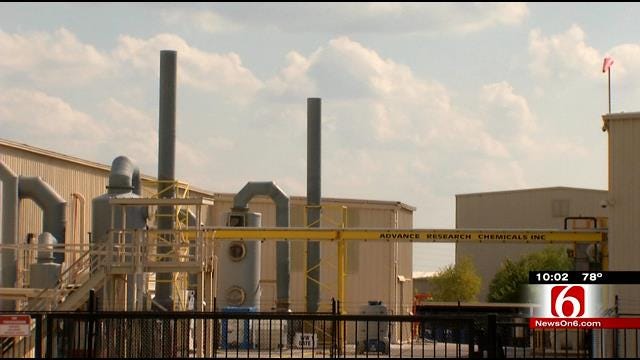Report: 500 Green Country Schools Near Chemical Plants, Could Be At Risk
A new report reveals nearly 500 Green Country schools are in close proximity to chemical plants, putting students at risk in the event of a chemical catastrophe.Tuesday, September 30th 2014, 11:01 pm
A new report reveals nearly 500 Green Country schools are in close proximity to chemical plants, putting students at risk in the event of a chemical catastrophe.
An executive with the plant said the report says it puts more Oklahoma students at risk than any other.
Brenntag Southwest at the Port of Catoosa stores 400,000 pounds of sulfur dioxide, which helps clean Tulsa's wastewater.
A report says in the event of a chemical emergency 125,000 students would be at risk.
It's not the largest chemical plant in Oklahoma, but a report by the Center for Effective Government says the plant poses the biggest threat to Oklahoma schoolchildren.
Port Director, Bob Portiss said, "I'm absolutely shocked, quite frankly. The closest school system to us, or school building, is about four miles away."
Portiss said he's worked there since the 70s, and there's never been a chemical disaster.
That's the way things were in west, Texas, before a fertilizer plant exploded in April 2013, and if students had been in school, more children might have been harmed.
The new report says students in Rogers, Mayes, Nowata, Tulsa and Washington counties are most at risk in the event of a chemical catastrophe.
The facilities putting them at risk include Brenntag Southwest at the Port of Catoosa, Baker Petrolite Corporation in Sand Springs, and Mohawk Water Treatment Plant and A.B. Jewell Water Treatment Plant, in Tulsa.
“We had some scares, probably out of ignorance, just ignorance on our own part quite frankly, but by in large, absolutely not, no,” said Portiss.
The Environmental Protection Agency requires chemical plants to create a risk management program, identifying potential risks to the community.
Brenntag Southwest executive Greg Cunningham said the company has done that, and has practiced emergency response with local HAZMAT teams.
The report also lists the top five schools at risk of chemical disaster in Oklahoma – Eugene Field, Nathan Hale, Charles Page, East Central and Skelly – each are in Green Country.
OSHA is asking companies to transition to safer chemicals.
More Like This
September 30th, 2014
January 2nd, 2025
September 29th, 2024
September 17th, 2024
Top Headlines
March 9th, 2025
March 8th, 2025
March 8th, 2025












